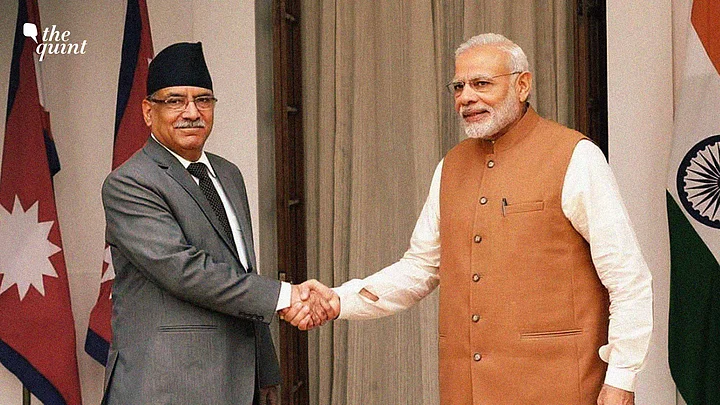Prime Minister of Nepal Pushpa Kamal Dahal, better known as Prachanda, will embark on a four-day official visit to India from 31 May along with a 48-member delegation. This is his third India visit as the Premier of Nepal and his first foreign trip since he took office in December 2022.
During his visit, he will call on the president and vice-president of India and hold extensive talks with Prime Minister Narendra Modi. He has said that the upcoming visit could see a breakthrough in some vital sectors like water resources and energy.
Prachanda has had a long association with India. He led the decade-long Maoist insurgency from 1996 to 2006 before joining mainstream politics after signing the twelve-point agreement in New Delhi. Of those ten years, he spent almost eight years underground in India.
Expected Outcomes
The bilateral discussions during this visit are said to be focused on economic agenda like hydropower (specifically on the Lower Arun project), cross-border energy trade, infrastructure development in terms of construction of transmission lines and sub-stations, and trade facilitation. An MoU on long-term power export of up to 10,000 MW in 10 years as per the prevailing CBTE guidelines from Nepal to India is on the cards.
Cooperation in the energy sector is already becoming a gamechanger in the Indo-Nepal ties and is set to see a boost during this visit. The Nepali side is also pressing on giving full momentum to all bilateral mechanisms existing between the two sides given the slowdown witnessed during COVID. “Because of the pandemic, we could not concentrate on many bilateral dialogues and other activities. But since the last 15-16 months, we have discussed several agreements and we hope to see some MoUs being signed this time during the PM’s visit,” Dr Shankher Sharma, Nepal’s ambassador’s to India told The Quint.
However, on the more contentious issues surrounding the border dispute, the Eminent Persons’ Group (EPG) report, and the opening of alternative air space for Nepal, there seems to be reluctance on the Indian side.
In 2020, the Nepal parliament endorsed a new map incorporating Lipulekh, Kalapani, and Limpiyadhura within its Northwest border between India and China. India includes these contested areas in its own official map. Whereas, the EPG report which was formulated with members from both the countries to revisit the contested issues, including the 1950 Treaty, is considered to be now dead as the Indian government has not accepted the report officially. This is a major issue of concern in Nepal.
In addition, the ‘Akhand Bharat’ mural in the new parliament building of India has depicted the Nepali territories of Lumbini and Kapilvastu. Many Nepali leaders have stated that such a depiction would generate “unnecessary mistrust” and "diplomatic tussle.” PM Prachanda is under pressure from the opposition to raise this matter with his counterpart. Also, the Nepal government has been seeking new air routes and air space from India for entry to Mahendranagar, Nepalgunj, Bhairahwa, Biratnagar, and Janakpur. This has been hard to come through from the Indian side as the newly built Pokhara and Lumbini airports were constructed with the aid of Chinese loans and joint ventures respectively.
Nepal PM’s Hindutva Outreach
On 2 June, PM Prachanda will visit Indore and offer prayers at the Mahakaleshwar Mandir, a rare event for a left leader who led the struggle to end monarchy in Nepal and to declare the country secular from being the only Hindu kingdom in the world.
The declaration of Nepal as a Federal Republic was the cornerstone of the Maoist struggle and Prachanda was at the forefront of this movement. Coming from opposite ideological spectrums, it has been often opined that the BJP along with the RSS and other right-wing outfits in India do not have comfortable relations with the left parties of Nepal.
Not long ago, Prachanda joined hands with Oli to form the Nepal Communist Party (NCP) which was perceived to be encouraged by China in Nepal as an effort to unite the communist parties of Nepal. The NCP, however, fell apart soon thereafter.
In July 2022, when Prachanda visited India in the capacity of the party president, a scheduled meeting with PM Modi did not take place. Sources in Delhi now claim that PM Prachanda may hold dialogues with important RSS members while in Indore.
Domestic Politics Is Key
The Maoist Supremo took office in December 2022 for the third time with the support of KP Oli-led CPN-UML and others, which was short-lived as he went on to support the opposition Nepali Congress (NC) candidate for presidential post. He has already faced two-floor tests in the House.
Moreover, the visit has come at the heels of a corruption scandal involving high-ranking government officials and politicians from the NC and UML parties that have rocked Nepali politics for over a month. Former Home Minister Bal Krishna Khand, former Deputy Prime Minister Top Bahadur Rayamajhi, and former Home Secretary are among those who have been arrested in the fake Bhutanese refugee scam.
PM Prachanda’s administration is under heavy public pressure at home to bring those involved in this scam to justice speedily and is under international scrutiny to identify those responsible for issuing fake refugee documents for third-country resettlement to the United States.
The volatile political situation does not bid well for Nepal-India relations. As Nepal is rocked by domestic controversies and unstable politics, it is unlikely that all-out support from India can be expected at this point. However, the visit can give impetus to the bilateral relations and encourage dialogues that could go a long way to resolve thorny issues and pave the way for development assistance from India which is vital for Nepal’s ailing economy.
(The author is a Nepali journalist, researcher based in New Delhi. This is an opinion piece and the views expressed above are the author’s own. The Quint neither endorses nor is responsible for the same.)
